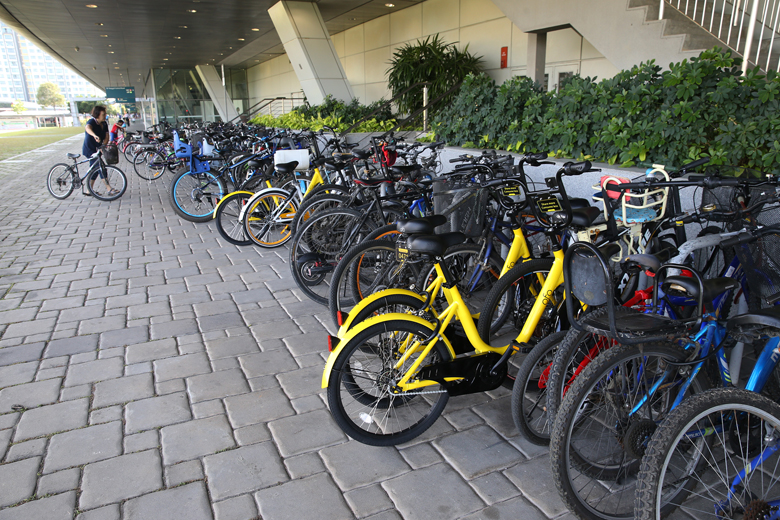Parliament: Bicycle parking spaces to be provided near most homes and key facilities
Sign up now: Get ST's newsletters delivered to your inbox

There are currently more than 170,000 bicycle parking spaces across the island, and plans are afoot to add another 50,000 by 2020.
PHOTO: ST FILE
Adrian Lim
Follow topic:
SINGAPORE - While it is not possible to have bicycle parking spaces at every doorstep, the Government will strive to locate them within a short walk of most households and key facilities.
There are currently more than 170,000 bicycle parking spaces across the island, and plans are afoot to add another 50,000 by 2020.
Senior Minister of State for Transport Lam Pin Min said this in Parliament on Tuesday (March 20), as new laws were passed to regulate dockless bicycle-sharing operators and users of the bicycles.
During the second reading of the Parking Places (Amendment) Bill, MPs such as Mr Gan Thiam Poh (Ang Mo Kio), Dr Teo Ho Pin (Bukit Panjang SMC), and Ms Joan Pereira (Tanjong Pagar) had bemoaned the unsightly mess caused by bicycles being left around haphazardly, calling for more bicycle parking spaces.
As the new law requires bike-share operators to share their data with the Land Transport Authority (LTA), said Dr Lam, this will help in identifying areas of high demand where more lots are needed.
He said more than 99 per cent of public homes and 90 per cent of private homes are already within a five-minute walk from bicycle parking.
Moreover, there are such parking areas near more than 80 per cent of what are considered key destinations, such as polyclinics, community centres, schools and town centres, he added.
As for parking spaces in private developments, Dr Lam said, the LTA will work with the bike-share operators and have them reach out to condominium managements, foreign worker dormitory operators and commercial buildings.
"However, the decision... ultimately rests with the private developer," he said.
Another measure to ensure people do not leave bicycles lying around is through the use of quick response (QR) codes, which the LTA will implement at public bicycle parking areas.
Under the new rules, operators will have to ensure users scan these codes at the parking areas before they can end their trip. Otherwise, they will continue to be charged for the rental session.
This will be on top of GPS-based geo-fencing that bike-share operators are required to implement. The technology creates a virtual boundary that sends out an alert when a bike enters or leaves an area.
But Ms Pereira raised concerns that users can take photos of the static QR code and just reuse them at different locations, thus defeating its purpose.
Dr Lam said each parking location will have a unique QR code, and the LTA will continue to study other methods of geo-fencing to more precisely pinpoint the bicycles' location.
He added that bicycle parking spaces will continue to be made available to users who have their own bicycles.
A total of seven MPs and one nominated MP cheered the new measures and spoke in support of the Bill.
Nominated MP K. Thanaletchimi, though, cautioned that the new regulations should not deter the take-up of bicycle-sharing and impede innovation and competition among operators.
Dr Lam said the Government does not intend for the licensing regime to be "unduly onerous".
"However, the licensing requirements are costs which should be internalised by the operators in the course of their business as they reflect the social disamenities caused and efforts needed to address them," he added.
To ensure that new operators are not deterred, the Government is considering implementing a "regulatory sandbox" which will allow them to "benefit from a trial phase as they scale up their operations and learn how to manage their fleet responsibly", he said.
Under this arrangement, they will be granted a much smaller fleet and be subject to a subset of the full licence requirement. The LTA will monitor their performance closely before determining whether to grant them a full licence.

